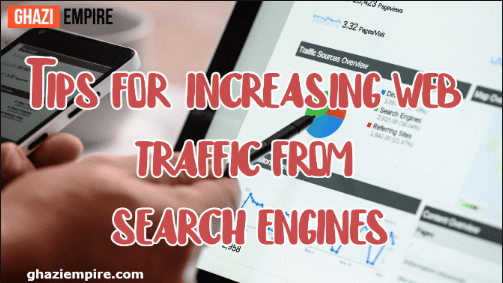Tips for increasing web traffic from search engines

Tips for increasing web traffic from search engines
Increasing web traffic from search engines is a key goal for many website owners and businesses. Here are some tips for optimizing your website to increase traffic from search engines:
- Use keywords: Conduct keyword research to identify the most relevant and frequently searched keywords for your industry or niche. Incorporate these keywords into your website’s content, titles, descriptions, and meta tags.
- Optimize your website structure: Make sure your website’s structure is clear and easy to navigate. Use internal linking to help search engines and users find relevant pages on your website.
- Create high-quality content: Focus on creating high-quality, informative, and engaging content that provides value to your target audience. Regularly update your website with fresh content to keep users and search engines coming back.
- Use header tags: Use header tags (H1, H2, H3) to break up your content into sections and make it easier for search engines to understand the structure of your page.
- Improve page speed: Ensure that your website loads quickly to improve user experience and search engine rankings. Use tools like Google’s PageSpeed Insights to identify and fix any speed issues.
- Build backlinks: Build high-quality backlinks from reputable websites to improve your website’s authority and increase visibility in search engine rankings.
- Use social media: Share your website’s content on social media platforms to increase visibility and drive traffic to your website.
- Use analytics: Use analytics tools like Google Analytics to track your website’s traffic and understand which pages and keywords are driving the most traffic.
By implementing these tips, you can optimize your website for search engines and increase traffic to your website. It’s important to remember that improving your search engine rankings and traffic takes time and consistent effort, but the long-term benefits can be significant.
How to Get More Web Traffic.
Conduct keyword research to identify the most relevant and frequently searched keywords for your industry or niche. Use these keywords in your website’s content, titles, descriptions, and meta tags. However, avoid “keyword stuffing” – using too many keywords in an attempt to manipulate search engine rankings. Your content should still read naturally and provide value to your audience.
Ensure your website’s structure is clear and easy to navigate. Use internal linking to connect related pages on your site, making it easier for search engines and users to find relevant content. Additionally, organize your content into categories and use descriptive URLs.
Optimize Your Website for Rankings
Use header tags (H1, H2, H3) to organize your content into sections and make it easier for search engines to understand your page’s structure. Use your target keywords in your header tags to signal the relevance of your content to search engines.
Search engines prioritize high-quality, informative, and engaging content. Focus on creating content that provides value to your audience and answers their questions or concerns. Use visuals like images and videos to break up long blocks of text and make your content more engaging.
How to Increase Web Traffic from Google.
Google AdWords is a great way to increase web traffic. To optimize your ads, follow these simple steps:
- Set up detailed ad targeting for your website or product. This will give you more control over what ads are shown to users.
- Place your ads in relevant places on Google, including the top search results and pages that users click on most often.
- Use keyword research to find specific keywords that are being used by people searching for your products or services online.
- Place those keywords in your ads, and make sure they are included in both the text and images of your ads.
- Optimize your images so they have high quality and look good on Google search results pages and other websites that rank high for searches related to your product or service.
- Make sure you regularly update your Google AdWords settings, so you stay ahead of changes made by Google itself or other third-party godparents like Facebook, Yahoo! Shopping, and Binghamton University’s School of Computing & Telecommunications.
Use tools like Google Analytics to track your website’s traffic and understand which pages and keywords are driving the most traffic. Analyzing your data can help you make informed decisions about optimizing your website for search engines and improving user experience.
Tips for increasing web traffic from search engines
Share your website’s content on social media platforms like Facebook, Twitter, and LinkedIn to increase visibility and drive traffic to your website. Engage with your followers and encourage them to share your content with their networks.
Backlinks from reputable websites signal to search engines that your content is valuable and relevant. Reach out to other websites in your industry or niche and request backlinks. Additionally, focus on creating high-quality content that others may naturally link to.
Slow-loading websites can result in a poor user experience and lower search engine rankings. Optimize your images, use a content delivery network (CDN), and minimize HTTP requests to improve your website’s speed. Tools like Google’s Page Speed Insights can provide insights and recommendations to improve your website’s speed.



